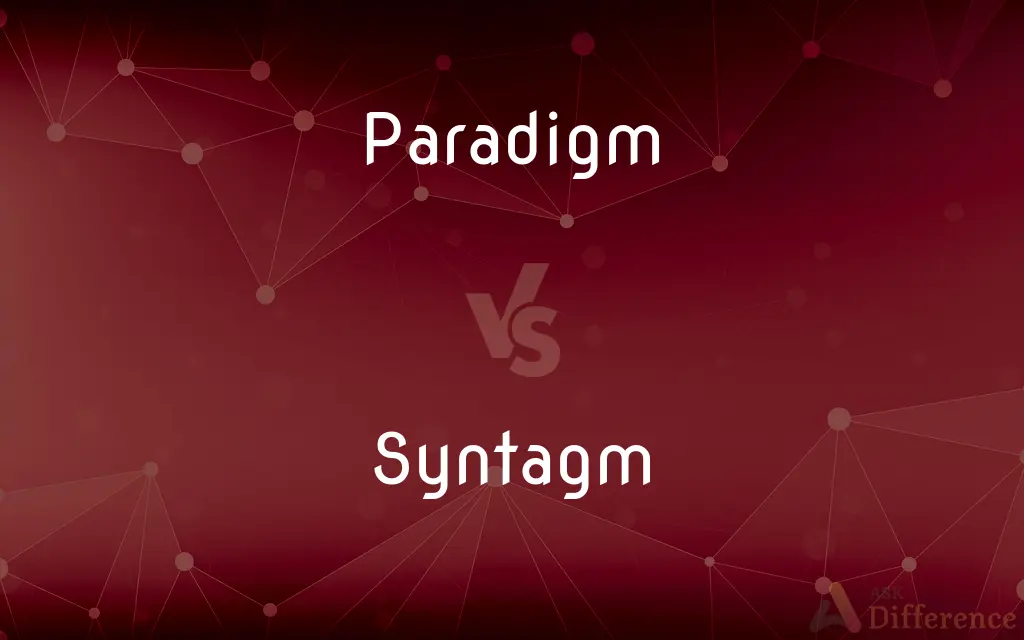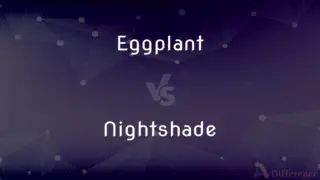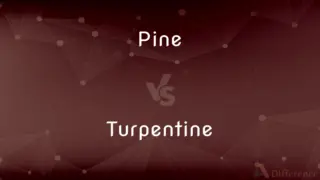Paradigm vs. Syntagm — What's the Difference?
By Tayyaba Rehman — Updated on September 27, 2023
A paradigm refers to a model or pattern of something; a syntagm is a linear sequence of words in a sentence where each has a defined role.

Difference Between Paradigm and Syntagm
Table of Contents
ADVERTISEMENT
Key Differences
Paradigm typically refers to a clear and accepted example or model of something. It is a term used to signify a set of concepts or thought patterns, including theories, research methods, postulates, and standards for what constitutes legitimate contributions to a field. In linguistic, a paradigm relates to a set of associated signifiers or entities which share a common feature, usually related to morphology. Paradigms help in structuring our understanding and interpretation of the world around us.
Syntagm, on the other hand, pertains to the structural relationship of words within a sentence in linguistics. It represents the horizontal relationship between elements in a text, reflecting how they connect in linear sequences to convey meaning. Syntagms are about the combination and arrangement of words, showing the syntactic structure and how each word in a sentence relates to the others to form coherent expressions.
In comparison, while a paradigm generally operates as a model or pattern that influences our thoughts and behaviors, providing structure and context to our understanding, syntagm specifically refers to the arrangement and relation of words in a sequence within a sentence. Paradigms are more about conceptual frameworks and models that guide our perceptions and actions, whereas syntagms are about the order and combination of words to construct meaningful sentences.
Paradigm in linguistics provides insights into how words can change form to convey different meanings, reflecting the variability within a language. For instance, it can illustrate the different forms a verb can take, depending on tense, mood, or aspect. Conversely, syntagm explores the syntactical connection, focusing on how words are linearly combined to generate understandable propositions, examining their structural and functional interrelation within sentences.
Comparison Chart
Nature
Conceptual model or pattern
Linear sequence of words in a sentence
ADVERTISEMENT
Field of Use
Various, including linguistics
Primarily linguistics
Function
Provides structure and context
Conveys meaning through word arrangement
Representation
Set of associated entities or concepts
Horizontal relationship between elements
Role in Linguistics
Shows variability within language
Examines structural and functional interrelation
Compare with Definitions
Paradigm
It acts as a standard or model that includes distinct concepts, methods, and standards within a discipline.
Quantum mechanics introduced a new paradigm in physics.
Syntagm
It signifies the ordered combination of interacting words within a sentence.
Breaking down the syntagm of a sentence reveals the role of each word.
Paradigm
It represents a typical example or pattern of something.
The theory of relativity was a shift in the scientific paradigm.
Syntagm
It reflects how different elements within a sentence are connected to construct meaning.
Understanding the syntagm is essential for deciphering sentence semantics.
Paradigm
It denotes a conceptual framework underlying the theories and practices of a subject.
His research challenged the prevailing paradigm of economic thought.
Syntagm
In linguistics, it represents the linear arrangement of words to convey meaning.
The structure of a sentence can be understood by examining its syntagm.
Paradigm
In linguistics, it refers to a set of associated linguistic elements related to morphology.
The conjugation of verbs falls under the verb paradigm in linguistics.
Syntagm
It refers to the horizontal relationship of units in linguistic expressions.
Linguists analyze syntagm to understand sentence composition and structure.
Paradigm
It is a shared set of understandings or presuppositions that frame one’s thinking.
The geocentric model was the dominant astronomical paradigm in ancient times.
Syntagm
It is a sequence of words in a particular syntactic relationship within a sentence.
The study of syntax involves analyzing the syntagm of a sentence.
Paradigm
In science and philosophy, a paradigm () is a distinct set of concepts or thought patterns, including theories, research methods, postulates, and standards for what constitutes legitimate contributions to a field.
Syntagm
A sequence of linguistic units in a syntagmatic relationship to one another.
Paradigm
A typical example or pattern of something; a pattern or model
Society's paradigm of the ‘ideal woman’
Syntagm
A sequence of words in a particular syntactic relationship to one another; a construction.
Paradigm
A set of linguistic items that form mutually exclusive choices in particular syntactic roles
English determiners form a paradigm: we can say ‘a book’ or ‘his book’ but not ‘a his book’
Syntagm
(linguistics) syntagma
Paradigm
(in the traditional grammar of Latin, Greek, and other inflected languages) a table of all the inflected forms of a particular verb, noun, or adjective, serving as a model for other words of the same conjugation or declension.
Syntagm
A syntactic string of words that forms a part of some larger syntactic unit
Paradigm
One that serves as a pattern or model.
Paradigm
A set or list of all the inflectional forms of a word or of one of its grammatical categories
The paradigm of an irregular verb.
Paradigm
A set of assumptions, concepts, values, and practices that constitutes a way of viewing reality for the community that shares them, especially in an intellectual discipline.
Paradigm
A pattern, a way of doing something, especially a pattern of thought, a system of beliefs, a conceptual framework.
Thomas Kuhn's landmark “The Structure of Scientific Revolutions” got people talking about paradigm shifts, to the point the word itself now suggests an incomplete or biased perspective.
Paradigm
An example serving as the model for such a pattern.
Paradigm
(linguistics) A set of all forms which contain a common element, especially the set of all inflectional forms of a word or a particular grammatical category.
The paradigm of "to sing" is "sing, sang, sung". The verb "to ring" follows the same paradigm.
Paradigm
An example; a model; a pattern.
Paradigm
An example of a conjugation or declension, showing a word in all its different forms of inflection.
Paradigm
An illustration, as by a parable or fable.
Paradigm
A theory providing a unifying explanation for a set of phenomena in some field, which serves to suggest methods to test the theory and develop a fuller understanding of the topic, and which is considered useful until it is be replaced by a newer theory providing more accurate explanations or explanations for a wider range of phenomena.
Paradigm
Systematic arrangement of all the inflected forms of a word
Paradigm
A standard or typical example;
He is the prototype of good breeding
He provided America with an image of the good father
Paradigm
The class of all items that can be substituted into the same position (or slot) in a grammatical sentence (are in paradigmatic relation with one another)
Paradigm
The generally accepted perspective of a particular discipline at a given time;
He framed the problem within the psychoanalytic paradigm
Common Curiosities
What is a Paradigm?
A paradigm is a typical example or model that provides a conceptual framework influencing thoughts and behaviors.
What does Syntagm refer to?
Syntagm refers to the linear sequence and structural relationship of words within a sentence in linguistics.
Share Your Discovery

Previous Comparison
Eggplant vs. Nightshade
Next Comparison
Pine vs. TurpentineAuthor Spotlight
Written by
Tayyaba RehmanTayyaba Rehman is a distinguished writer, currently serving as a primary contributor to askdifference.com. As a researcher in semantics and etymology, Tayyaba's passion for the complexity of languages and their distinctions has found a perfect home on the platform. Tayyaba delves into the intricacies of language, distinguishing between commonly confused words and phrases, thereby providing clarity for readers worldwide.














































